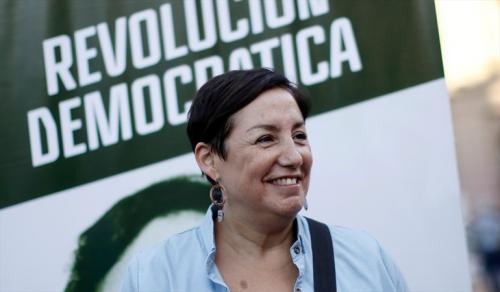The new left in Chile
In Chile there are real signs of a new left that has come to stay and dispute the next municipal and presidential elections, with fair perspectives of victory.
- Opinión

The Latin American left is not limited to that of countries that have or previously had anti neoliberal governments in this century, plus Mexico, where López Obrador finally won the elections and will assume the Presidency at the end of the year.
Over the past year, two candidates from two countries, with surprising performances, obtained voting that projects them as new and important leaders of the left in Peru and Chile. In Peru, after a good performance from Veronika Mendoza, at the head of the Frente Amplio, unfortunately the Frente was divided.
As an offset, in Chile there are real signs of a new left that has come to stay and dispute the next municipal and presidential elections, with fair perspectives of victory. These forces are grouped in the Frente Amplio (Broad Front) that brings together some 13 political groups, with distinct nuances, from liberal democrats to anticapitalists that, as a product of fusions under way, will soon be less in number.
The Frente Amplio ran for the Presidency with the journalist Beatriz Sánchez who, in spite of the polls predicting that she would not reach two digits in the voting, took 21%, almost reaching the second round. The Frente Amplio elected a sizeable bench of 21 deputies and one senator, from various regions of the country, surpassing the Communist Party and the Christian Democrats, to make up the third force in the Chamber, a little behind the Socialist Party.
In fact, the crisis of the Socialist Party, after the second presidential mandate of Michelle Bachelet, created space for a new force to occupy the central place on the left. Up to that time, Chile had lived through four mandates of the Concertation – an alliance between the Socialist Party and the Christian Democrats – and, more recently, the alternating governments of Bachelet (twice) and Sebastián Piñera (twice), of which the latter represents the return of the rightwing to government, after the end of the Pinochet dictatorship.
As well as the candidacy of the principal leader of the Frente Amplio, the left includes the young mayor of Valparaiso, Jorge Sharp, who also surprisingly triumphed over candidates both of the right and the Concertation, and is carrying out a very good administration, with huge popular support.
As an example of the democratic and popular form of administration of this young mayor, he had a confrontation with the powerful companies of housing speculators, that proposed to build, on one of the hills that characterize Valparaiso, high-rise buildings of over 20 stories, which would radically alter the urban landscape of the zone, in addition to causing problems of contamination and transport, among others. The mayor’s office managed to mobilize the local population directly affected by these projects, as well as public opinion in the city, and impose a maximum limit of four stories. A great victory of the mayor’s office over these housing giants.
Sharp is part of the Frente Amplio and the party of Citizens’ Power, that I was able to get to know as an example of the components of the Frente. A party that brings together militants of the student mobilizations, but above all of the popular neighborhoods of various regions of Chile. It is a good example of the new left in Chile.
This sizeable group of young militants already has good experiences of work among the grassroots, with an excellent political level, an interest in political education and enthusiasm and confidence in the future of the country. They seek to build a people’s national project for Chile, in the framework of a democratic struggle on a mass level, led by a political scientist, Karina Oliva, with a new and creative style of political leadership.
Political groups such as the Democratic Revolution, the Autonomist Movement, the Humanist Party, the Liberal Party, Libertarian Left, Green Ecological Party, Autonomous Left, Equality Party, New Democracy, the Pirate Party of Chile, the Movement Socialism and Freedom and the Democratic Popular Movement all take part in the Frente Amplio. From the simple statement of the names of these groups, one can note the diversity that the Frente Amplio brings together, proposing to make this spectrum an element in strength, in a framework of firm unity, in spite of their differences, at times of a certain magnitude, over several issues of Chilean and international policy.
This is, without a doubt, the new face of the Chilean left. After the unforgettable experience of the government of Salvador Allende, the hard times of resistance to the dictatorship of Pinochet, and then the frustrating experience of the long democratic transition, the Frente Amplio marks a new chapter in the history of the Chilean left, and is preparing for an even better performance in the municipal elections in a year and a half and the presidential elections three and a half years away.
(Translated for ALAI by Jordan Bishop)
- Emir Sader, Brazilian sociologist and political scientist, is the coordinator of the Laboratorio de Políticas Públicas of the State University of Rio de Janeiro (UERJ).
Del mismo autor
- Hay que derrotar políticamente a los militares brasileños 07/04/2022
- China y Trump se fortalecen 04/03/2022
- Pandemia e Ucrânia aceleram decadência da hegemonia norte-americana no mundo 28/02/2022
- Pandemia y Ucrania aceleran la decadencia de la hegemonía norteamericana en el mundo 28/02/2022
- La anti-política generó la fuerza de extrema derecha 22/02/2022
- Las responsabilidades del PT 10/02/2022
- Estados Unidos, más aislado que nunca en América Latina 03/02/2022
- Memoria y olvido en Brasil 27/01/2022
- 2022: tiempos decisivos para Brasil y Colombia 05/01/2022
- Brasil: una historia hecha de pactos de élite 18/12/2021
